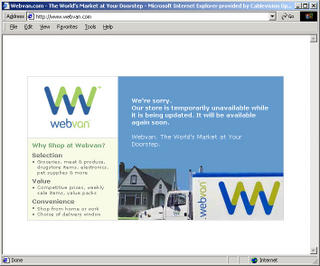Perished Good: Webvan's Last Days
 I've been reading "Knowledge @ Wharton: Creating Corporate Value" ever since I got back from visiting UPENN.
I've been reading "Knowledge @ Wharton: Creating Corporate Value" ever since I got back from visiting UPENN.The book has a great chapter on Webvan, the online credit and delivery grocery business that went belly up in 2001 along with hundreds and hundreds of other dot.com flameouts.
Webvan's demise is often dissected inside top B-schools as an example of how Internet business models don't always align with those of traditional brick-and-mortars.
Nothing could save this company.
It's too bad, because like my other favorite dot.bomber --Kozmo.com -- the premise behind the business was pretty damn good.
It's just that like everyone else, this dot.commer couldn't sustain operating cash flow!
Amidst a heated rivalry with Homegrocer.com, Webvan recruited George Shaheen, an old-school exec from Accenture lured by the 15 million stock options he was promised at the startup.
One of his earliest decisions: Webvan, as much money as it was bleeding, should buy their main competitor, HomeGrocer.
Did I mention that Webvan was
But since the mantra of the Bubble Age was "Get Big Fast," it's clear Webvan was acting purely out of desperation.
Webvan CEO Shaheen thought it was the only way they could survive and build a massive customer base without having to go back to their VCs:
"It made business sense when we looked at where we were in our rollout and the markets we could get into without spending our capital," Shaheen says. "Plus we wouldn't have to spend money to compete against each other."Now don't get me wrong, mergers are the textbook way to exploit synergies and scalability, but Webvan was moving too damn fast for its own good.
You don't give a newborn a tricycle as he's coming out of the hospital.
Unless you sadistically enjoy seeing infants crash into pavement.
What Webvan miscalculated was that people would rather go to the grocery themselves than have it delivered.
Especially when home delivery doesn't save the customer a cent.
Unprofitable is unprofitable.
I've always believed that no matter how seasoned the management team is, if the business model is challenged, the business model comes out on top.
Remember earlier how I said the idea was a good one?
When Webvan arrived on the scene in 1998, online grocery shopping was a functional, viable business opportunity, as established retailers had been proving with their proprietary websites.
And unlike, say, govWorks.com, at least Webvan had the decency to find reputable management to steer the company through the New Economy's perilous waters.
Nevertheless, Shaheen made one huge blunder -- he frowned on established retailers like Albertson's Inc. and Safeway.
Webvan's fall is not a testament to poor service quality.
Rather, its a finger at poor management decisions.
Just about everyone I speak to concurs: The #1 mistake Webvan made was trying to build and support its infrastructure on its own, instead of partnering with existing supermarket chains & wholesalers.
Like Kozmo.com, Webvan expanded too aggressively without enlisting an Old Economy veteran to hold its hand.
That's why I always say Europeans do it smarter: they test markets out before they blow through cash trying to reinvent the wheel.
American-like, Webvan chose to burn through money like rock stars at the Bellagio.
And the investment community, you ask?
Well, they eschewed Webvan's munchies for a piece of its common, which after an explosive IPO, fell from $34 to pennies when the company was forced to show profits it could, at that point, only pray for.
<< Home